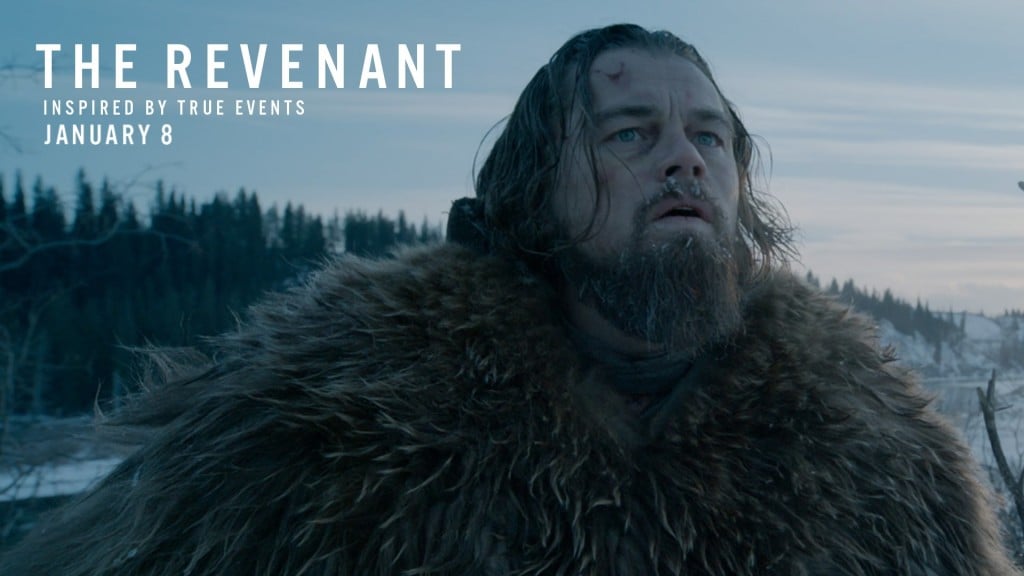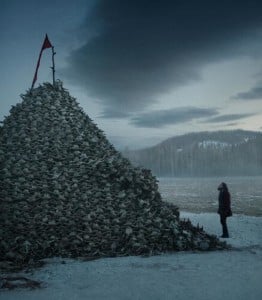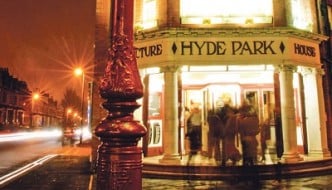Film review: The Revenant
January 18, 2016

With the swelling ballyhoo surrounding Birdman (2014) still ringing in his ears, Alejandro Gonzalez Inarritu set off for the southern tip of Argentina to capture the amazing true story of Hugh Glass, a trapper who battles everything the elements can throw at him to avenge the murder of his son in early Nineteenth Century Louisiana. The shooting of The Revenant has been described as ‘miserable’ and ‘a living hell’ by certain cast and crew members, with lengthy delays, walk-outs and battles with producers over its spiralling budget. The production had more than a whiff of Heaven’s Gate (1980), Michael Cimino’s ill-fated follow-up to his Best Picture-winning The Deer Hunter (1978).
The Revenant takes place in 1823, making it a Pre-Western. The America depicted here is not the mythic once that usually graces the screen. This is an America before the frontier was settled; a time before the oil and gold rushes when animal pelts were the chief currency; a melting pot of English, French, Mexican, Spanish, Canadian and Native American tribes fighting for primacy. It is a time of lawlessness which Inarritu and writer Mark L. Smith use to critique the excesses of unregulated capitalism and rapacious environmental plunder. The background of the story is almost as fascinating as Glass’s agonising odyssey.
 The ordeal of shooting seems to have galvanised the cast and crew to push through the discomfort and create something truly special: ‘not fun, but effective,’ as Inarritu describes it. The Revenant is pure cinema, lying somewhere between the epic vistas of David Lean and the existential drama of Andrei Tarkovsky. There are echoes of Werner Herzog’s Aguirre, the Wrath of God (1972) in its evocation of men striving to conquer an environment that is utterly indifferent to their struggle. But the primary point of reference is Terrence Malick, particularly The Thin Red Line (1998) and The New World (2005) – on which The Revenant‘s cinematographer, Emmanuel ‘Chivo’ Lubezki, worked. We see Malick’s animistic sensibility in the cutaways to nature watching impassively, and in the roaming long takes. Another work with which The Revenant shares DNA is Cormac McCarthy’s novel Blood Meridian (1985), which everyone from Ridley Scott to James Franco has tried to adapt and which mirrors The Revenant‘s unflinching brutality and genocidal motifs.
The ordeal of shooting seems to have galvanised the cast and crew to push through the discomfort and create something truly special: ‘not fun, but effective,’ as Inarritu describes it. The Revenant is pure cinema, lying somewhere between the epic vistas of David Lean and the existential drama of Andrei Tarkovsky. There are echoes of Werner Herzog’s Aguirre, the Wrath of God (1972) in its evocation of men striving to conquer an environment that is utterly indifferent to their struggle. But the primary point of reference is Terrence Malick, particularly The Thin Red Line (1998) and The New World (2005) – on which The Revenant‘s cinematographer, Emmanuel ‘Chivo’ Lubezki, worked. We see Malick’s animistic sensibility in the cutaways to nature watching impassively, and in the roaming long takes. Another work with which The Revenant shares DNA is Cormac McCarthy’s novel Blood Meridian (1985), which everyone from Ridley Scott to James Franco has tried to adapt and which mirrors The Revenant‘s unflinching brutality and genocidal motifs.
The Inarritu/Lubezki tandem has pulled off another technical feat here, augmenting the contrivances of Birdman to startling effect. The kinetic camerawork of Birdman is set free to explore this unforgiving wilderness, every frame brimming with fresh invention. Lubezki cements his standing as one of the greats of his craft. He has raised the bar once again and would completely deserve his third consecutive Oscar. ‘Chivo’ has succeeded in creating a sense of simultaneous scale and immediacy, harnessing natural light beautifully, shooting faces like landscapes, utilising lens flare, getting so close to his subject that their breath fogs the lens. Lubezki’s camera is a living organism, diminishing the space between screen and viewer to create an immersive experience that 3-D could never hope to match: a case in point being the brutal, breathless spectacle of the infamous bear attack sequence.
 Over the last few years, Leonardo DiCaprio seems to have unlocked something in himself. His picaresque turn in The Wolf of Wall Street (2013) signalled the maturation of this new looseness. There is a ferocity and vulnerability to DiCaprio’s Hugh Glass which pushes this evolution further. With a minimum of dialogue, DiCaprio is able to articulate the torture of a man caught in the gears of a merciless machine. Tom Hardy approaches the role of John Fitzgerald with equal pathos. His performance fits into the film’s thesis that ‘revenge is in God’s hands.’ Fitzgerald is not the treacherous villain he would have been in a standard revenge thriller, but merely a product of his environment. Will Poulter delivers a sterling performance as the well-meaning Bridger. Poulter was a prodigious child actor and is maturing into an accomplished character actor in the Eddie Marsan mould. Domhnall Gleeson is equally impressive as Captain Henry, a man trying to fight back the tide of barbarity and imbue this lawless landscape with the values of ‘civilisation.’
Over the last few years, Leonardo DiCaprio seems to have unlocked something in himself. His picaresque turn in The Wolf of Wall Street (2013) signalled the maturation of this new looseness. There is a ferocity and vulnerability to DiCaprio’s Hugh Glass which pushes this evolution further. With a minimum of dialogue, DiCaprio is able to articulate the torture of a man caught in the gears of a merciless machine. Tom Hardy approaches the role of John Fitzgerald with equal pathos. His performance fits into the film’s thesis that ‘revenge is in God’s hands.’ Fitzgerald is not the treacherous villain he would have been in a standard revenge thriller, but merely a product of his environment. Will Poulter delivers a sterling performance as the well-meaning Bridger. Poulter was a prodigious child actor and is maturing into an accomplished character actor in the Eddie Marsan mould. Domhnall Gleeson is equally impressive as Captain Henry, a man trying to fight back the tide of barbarity and imbue this lawless landscape with the values of ‘civilisation.’
What The Revenant does better than almost any other film of its scope is offer a visceral experience without losing its humanity. This is a $100 million art film which strikes an almost magical-realist note. The boldness of a director’s vision is the only thing that will keep cinema vital, not gimmicks or high-concept gloss, but harnessing the fundamental components of the medium to their fullest potential. Like Inception (2010) before it, The Revenant gives the lie to the rationale trotted out by the Michael Bays of this world that a mass audience will not tolerate psychological complexity. The Revenant is at times oppressively bleak, wearing its existentialism on its sleeve, but there are moments which leaven the presentiment and hint towards the infinite. With the advent of digital technology, the opportunity for filmmakers to get lost in the wilderness has all but disappeared, which makes the peril and adventurism of The Revenant such a vital cinematic experience.
Filed under: Film, TV & Tech
Tagged with: Alejandro Gonzalez Inarritu, film, review, Sheffield, The Revenant



Comments